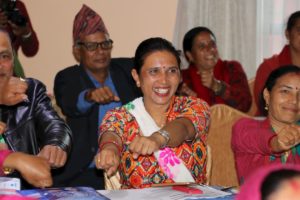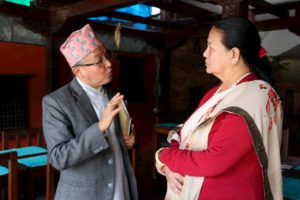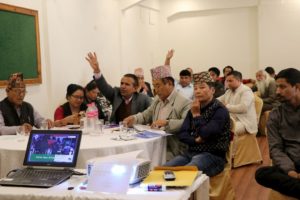The Election Commission, Nepal (ECN), continued efforts to deliver on its commitment to conduct credible elections for consolidating Nepal’s democracy by working with a range of different partners, most recently in Pokhara, where the by-election for a seat in the House of Representatives is to be held on 30 November 2019. From 3 to 5 November, ECN facilitated a workshop with the Community Learning Centres (CLCs) on how CLCs can provide civic and electoral education to their local communities, especially marginalized ones. ECN also led a training workshop on Electoral Dispute Resolution (EDR) with representatives from political parties, the District Administration Office, security forces, the District Attorney Office, media, observers and other representatives from Civil Society on 4 November 2019.

At the workshop with the community learning centres, the Chief Election Commissioner Dinesh Kumar Thapaliya emphasised the important role that community-level organisations can play in dispensing civic and voter education at the grassroots. He stated, “CLCs can urge the community members to cast their votes in the upcoming by-elections, teach the community on the technique of voting so that no vote is invalid, and provide them with factual information so as to allow each voter to cast an informed vote.”
The Chairperson of Shikharapur CLC Shyam Bahadur K.C., speaking on behalf of all the participants, stated that they were very happy to have the Chief Election Commissioner attend the event, adding that such workshops empower CLCs and provide them with an opportunity to take civic and voter education to the community level to strengthen democracy. During the workshop, the CLC managers and facilitators learned about the electoral system, the election process, as well as the duties, roles and responsibilities of electoral stakeholders. They also partook in a mock polling exercise at the Electoral Education and Information Centre located in the ECN District Election Office. The sessions on elections helped clarify the electoral process for the participants, and they committed to taking their learning from the workshop to share it with their community members.

At the workshop on electoral dispute resolution, there was a lively and interactive discussion around electoral disputes and how to resolve them. The sessions included the electoral legal framework, electoral disputes, violence and offences, mechanisms for electoral dispute resolution and the hearing process. The Chief Election Commissioner stressed the importance of resolving electoral disputes in a timely manner and at the right level by the responsible authority for effective results. He reaffirmed the aim of ECN to ensure that elections can contribute to strengthened democracy.
The workshop participants expressed their trust in the ECN to conduct free, fair and credible elections. They also took it as an opportunity for Kaski district to demonstrate a credible process so as to become a model for others.

The community learning centre event included a total of 49 participants, with 38 women, and the electoral dispute resolution workshop included a total of 44 participants, with 10 women. The CLC workshops have taken place in Bhaktapur, Baglung, Panchthar, Dang, Sunsari and are supported by the ECN, the European Union, UNDP and UNESCO. Likewise, the EDR training workshops have taken place in Bhaktapur and Sunsari and are supported by the ECN, the European Union and UNDP. Both series of events intend to cover the areas in which by-elections will take place at the end of November, and more such workshops are scheduled for the coming days.
The Electoral Support Project- Phase II (ESP) is a technical assistance initiative which focuses on a long-term institutional and professional capacity development of the Election Commission Nepal (ECN) to conduct credible, inclusive and transparent elections. The objectives of the project are 1) to strengthen the capacity of the ECN to function as an independent and credible institution, 2) to allow the conduct of the election cycle in an effective, sustainable, and credible manner, and 3) to increase democratic participation, particularly for under-represented and disadvantaged segments of the Nepali society. The ESP is currently funded by the EU.
